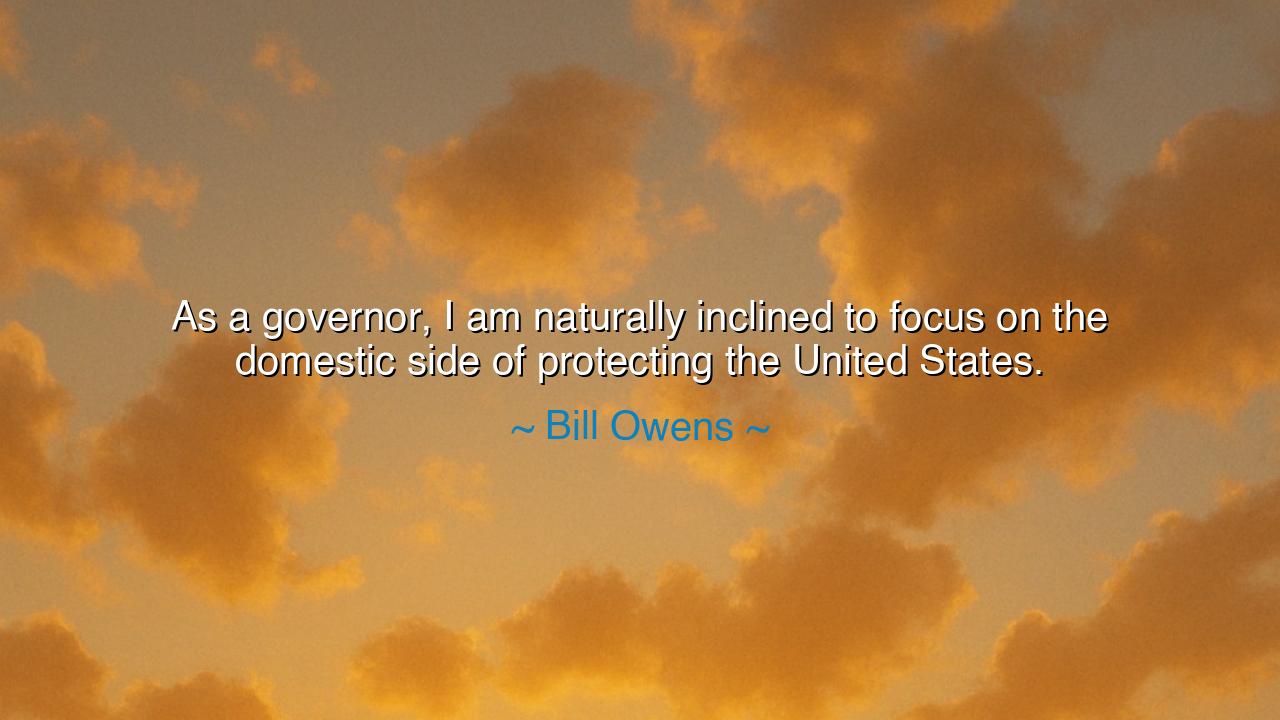
As a governor, I am naturally inclined to focus on the domestic
As a governor, I am naturally inclined to focus on the domestic side of protecting the United States.






In an age when the security of nations depends not only on armies abroad but on the strength of communities within, Bill Owens, the former Governor of Colorado, spoke with quiet conviction: “As a governor, I am naturally inclined to focus on the domestic side of protecting the United States.” Though simple in tone, these words reveal a wisdom that runs deep — a truth about leadership, duty, and the unseen guardianship that begins not in distant battlefields but in the hearts, homes, and institutions of one’s own land. For Owens reminds us that the defense of a nation does not rest solely in the hands of soldiers, but also in the vigilance of its citizens, the justice of its laws, and the strength of its communities.
The origin of this thought lies in the very nature of the governor’s role. Unlike the President, who commands armies and crafts foreign policy, the governor is the guardian of the homeland — the protector of the daily life of the people. Bill Owens spoke these words in the shadow of September 11, 2001, when America’s sense of safety had been shattered. While the nation turned its eyes outward to foreign threats, Owens looked inward. He understood that true security begins not at the border, but at the foundation — in the roads that carry our supplies, in the schools that shape our minds, and in the trust that binds our citizens. He saw that the duty of a governor was not to command war, but to preserve the peace and resilience of the people he served.
Throughout history, great leaders have known this truth: that the strength of a nation is built from within. The mighty Roman Republic, before it fell to corruption and conquest, was powerful not because of its legions alone, but because of the discipline, law, and civic virtue of its citizens. When those virtues decayed — when public service became self-interest and unity gave way to division — even the strongest armies could not save it. So it is with every nation. A fortress without moral foundation is but a shell. A people divided cannot be defended. Owens’ words, then, are a reminder that to protect a nation, one must first nurture its domestic spirit, that invisible force which gives life to its institutions and purpose to its people.
Consider the American home front during the Second World War. While soldiers fought across oceans, the people at home labored in factories, rationed their food, and built the machines of freedom. Victory was not won by arms alone, but by unity — the will of ordinary citizens who understood that their work, their sacrifice, and their steadfastness were as vital to national defense as the courage of those in uniform. That is the essence of what Owens means by the “domestic side of protecting the United States.” The unseen efforts — the teachers guiding children, the workers keeping the lights on, the governors ensuring safety and order — are the quiet, enduring acts of patriotism that keep a nation from within.
Yet Owens’ words carry another lesson: that leadership begins at home. Before one can protect a nation, one must protect one’s community; before one can govern a state, one must first understand its people. The domestic sphere — the local, the immediate, the familiar — is where the seeds of strength and decay are both sown. If corruption, inequality, or neglect take root within, then no army, however mighty, can defend what has already rotted at its core. The truest leaders, like Owens, know that their first duty is to fortify the spirit of their people — through justice, education, compassion, and law.
But this wisdom does not belong only to rulers. Each of us, in our own small way, holds a share of the domestic duty. Every parent who raises a child in kindness, every citizen who serves their neighbor, every worker who labors with integrity contributes to the unseen wall that guards the republic. A government can protect borders, but only the people can preserve a way of life. In this sense, every household is a fortress, every classroom a training ground, every act of decency a shield.
The lesson, therefore, is this: do not look only to distant powers to defend your nation. Strength begins where you stand. Protect your home, your family, your community, and you protect your country. Build schools before you build walls; heal divisions before you march to war. For the greatest danger to a nation is not always the enemy without, but the decay within — the slow crumbling of unity, virtue, and faith.
And so, my child of the republic, remember Bill Owens’ words as both a call to duty and a guide for wisdom. The defense of your country is not only the work of soldiers, but of citizens. The flag is protected not only by those who carry rifles, but by those who carry responsibility. To guard the homeland is to live rightly, to care deeply, and to serve faithfully. For only when the domestic side of a nation is strong can it stand tall before the storms of the world.






AAdministratorAdministrator
Welcome, honored guests. Please leave a comment, we will respond soon